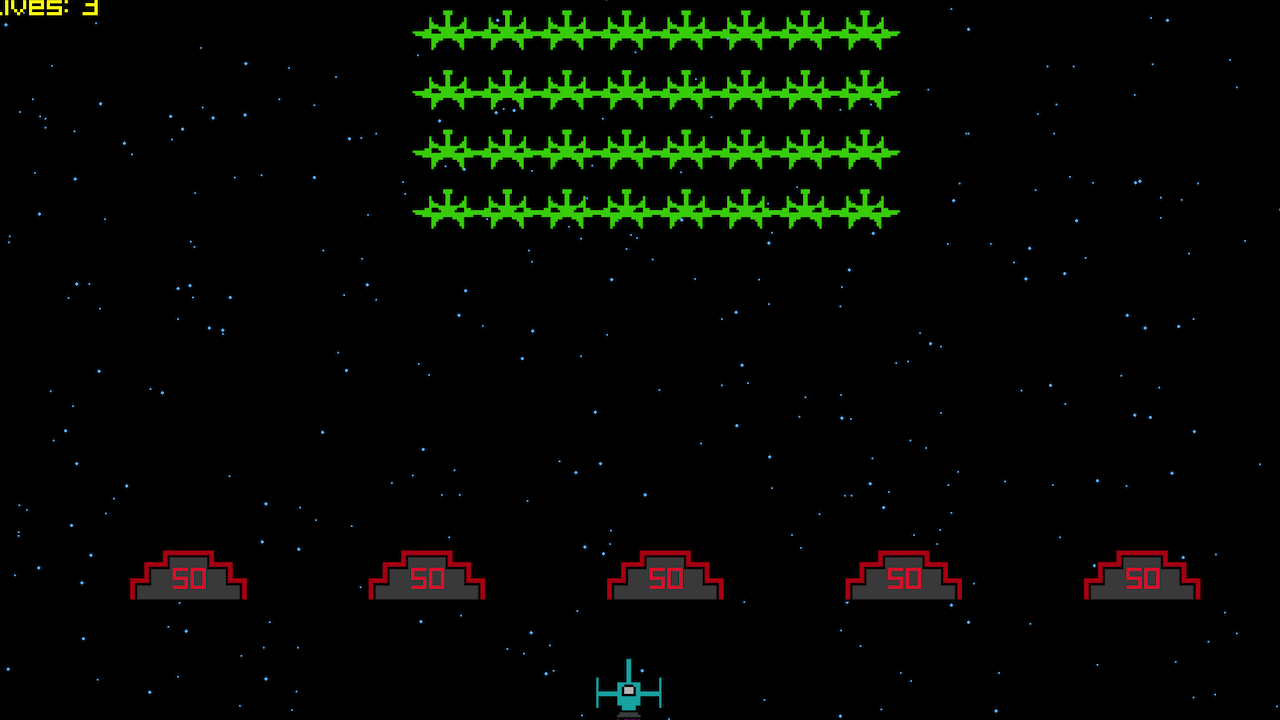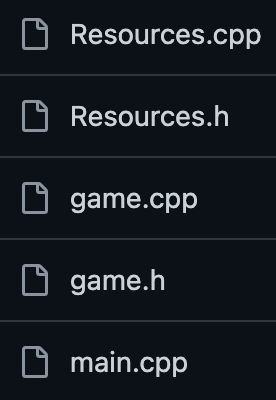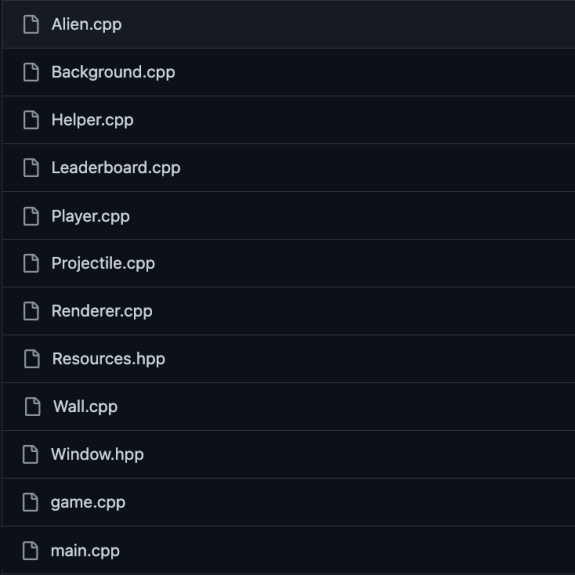Space Invaders Refactor

Given a Space Invaders Project produced by junior programmers back at university, I refactored their code to include idiomatic modern C++, clean code and good API design.
See the commits at GitHubCore Issues
Upon reviewing the codebase, this project's core issue is the constant violation of Single Responsibility Principle. Here are a few indicators of how the codebase violates the principle:
- Physical structure: In this project, there are only 3
.cppfiles
- Logical structure: The
game.cppfile holds all the objects involved with the game (Projectile, Wall, etc...). As a result,game.cppwas 939 lines long - Three-step initialization: A lot of objects would be created in a local variable, with a couple of lines changing special parameters, and in some cases, calling a launch function. The object itself isn’t handling itself, but another object. Here's an snippet of Three-step initialisation:
Game game = { State::STARTSCREEN }; // from a defined enum State {STARTSCREEN, ...};
Resources resources;
game.resources = resources;
game.Launch();Immediate Solutions
When dealing with a messy project, it's hard to know where to start. I always like to get my feet stabilised by first making all the logic more readable. Here are some immediate steps I could do.
One file per object
One easy way to alleviate the violation of Single Responsibility Principle is by giving each defined object a file of it's own. This already reduced game.cpp to 367 lines.

More Functions
All meaningful operations were properly packaged into named functions so that the core functions (Game::Update()) bacame more readable (as per C++ Core Guidelines F.1). Here is one example:
void Game::HandleProjectileHit() noexcept {
// Take care of Out of Bound Projectiles
RemoveOutOfScreenProjectiles(PlayerProjectiles);
RemoveOutOfScreenProjectiles(AlienProjectiles);
// Take care of projectiles that hit walls, decreasing wall health
RemoveWallHitProjectiles(PlayerProjectiles);
RemoveWallHitProjectiles(AlienProjectiles);
// Take care of entity hits, decreasing entity's health
RemoveAlienHitProjectiles(PlayerProjectiles);
RemovePlayerHitProjectiles(AlienProjectiles);
}Group functions
Now that the code was easier to read, it was also easier to understand which responsibilities actually belonged in game.cpp. For example, all rendering functions can be grouped into a new class that handles solely rendering.
class Renderer {
private:
...
public:
[[nodiscard]] int GetPlayerActiveTexture() const noexcept { return playerActiveTexture; }
[[nodiscard]] bool mouseOnText() const noexcept { return CheckCollisionPointRec(GetMousePosition(), textBox); }
void UpdatePlayerAnimation() noexcept;
void StartScreen() const noexcept;
void GameplayText(int score, int lives) const noexcept;
void DefaultEndScreen() const noexcept;
void HighscoreScreen(std::string name, int maxChar) noexcept;
};This trimmed game.cpp to 223 lines.
Better Constructors
Better Constructors was then finally implemented. This minimizes the number of dynamic variables needed for object creation, so that creation only needs one line.
Wall(const Vector2& pos) noexcept : position(pos) {};for (int i = 0; i < wallCount; i++) {
const auto pos = Vector2{wallDistance * (i+1), wallsPositionY}; // Position calculations
Walls.emplace_back(Wall(pos)) // game.cpp holds list `Walls` to contain all walls
} Not only is it a lot safer, it's also a lot more readable and less complex.
Advanced Improvements
RAII
Ensure critical resources such as texture or window is handled properly with constructor, destructor, and exception specifying.
class Window {
public:
Window(const int screenWidth, const int screenHeight, std::string_view title) {
try {
InitWindow(screenWidth, screenHeight, title.data());
}
catch (const std::runtime_error& e) {
std::println("Error: Could not create window", e.what());
}
};
~Window() { CloseWindow(); };
Window(const Window& other) = delete;
Window operator= (const Window& other) = delete;
Window(const Window&& other) = delete;
Window operator= (const Window&& other) = delete;
};This ensures that objects are always created in a valid state.
Pipelined logic
Reduce complexity by keeping only essential data, and relying more on simple calculations
For example, projectile doesn't need to keep updating a line start/end, just a position that renderer will draw out.
// --- BEFORE ---
struct Projectile {
public:
// INITIALIZE PROJECTILE WHILE DEFINING IF ITS PLAYER OR ENEMY
Vector2 position = {0,0};
int speed = 15;
bool active = true;
EntityType type = {};
// LINE WILL UPDATE WITH POSITION FOR CALCULATIONS
Vector2 lineStart = { 0, 0 };
Vector2 lineEnd = { 0, 0 };
void Update();
void Render(Texture2D texture);
};// --- AFTER ---
static constexpr int PROJECTILE_LENGTH = 15;
class Projectile {
private:
int speed = 15;
Vector2 position = { 0, 0 };
public:
Projectile(Vector2 pos, bool isPlayerProjectile) noexcept;
void Update() noexcept { position.y += speed; };
void Render(Texture2D texture) const noexcept;
[[nodiscard]] Vector2 GetPosition() const noexcept { return position; }
[[nodiscard]] bool IsOutOfScreen() const noexcept { return GetPosition().y < 0 || GetPosition().y > GetScreenHeightF(); }
};Modern C++
Seen throughout this post, you can see that Modern C++ was adhered. Here are some examples:
.hppfiles specifying that the code is only meant to be read using C++.- Sticking to simple datatypes that doesn't need custom destructors, copy/move constructors nor assignments, Adhering to the Rule of 0
for-rangeloopsstatic_castover c-style cast if necessary- using
std::algorithms(remove_if(),for_each(), etc...) auto,[[nodiscard]],constexpr,noexcepts
Results: 939→184 lines
- 939→184 lines: After this refactor, game.cpp turned from 939 to 18 lines, which proves that Single Responsibility Principle is a lot less violated.
- Readability: Because all meaningful operations and values have been stored and named, the code reads like English.
- Modern C++: Using C++ Core Guidelines, textbooks and C++ Convention Talks, motivated decisions were properly sourced to improve the code
How to further improve this?
- State Machine: Further adhere to Single Responsibility Principle by implementing a state machine handling different states
- Bug in
OwnTexture: The special member operations are not handling all the members of the class, which means a copied texture will take anundefined _path. - Greater optimisation: The code could be further optimised. Examples include using
auto-lambdatemplates,string_view, and less unnecessary copy withemplace_back.